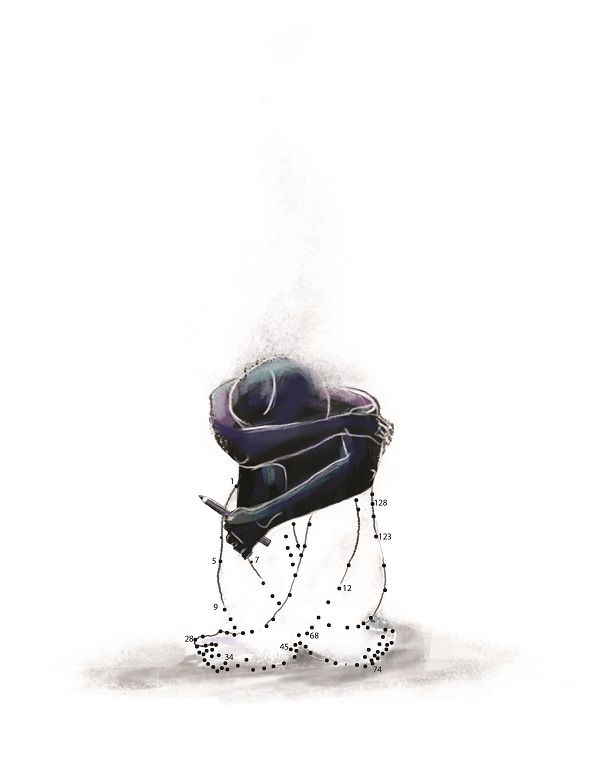The Crazy Ones
I remember the twisted faces made when they saw me. I remember the hurtful comments. “She’s crazy”, they would say. They would talk behind my back, and stare both frightened and intrigued. Most of all, they would judge and make assumptions, all of them hurtful. It’s as if I had neon lights on my forehead that were simultaneously attracting and blinding every passerby.
 Whenever I would encounter a situation like this, I would think of my friends from the treatment center. Are they crazy? No, in fact they are the most incredibly strong and down to earth people I have ever met. The fact that they have cuts on their wrists and they are starving themselves does not mean they are crazy. It means that they are ill. Most of all, it means that they are in pain. And the society that you are part of is contributing to that pain.
Whenever I would encounter a situation like this, I would think of my friends from the treatment center. Are they crazy? No, in fact they are the most incredibly strong and down to earth people I have ever met. The fact that they have cuts on their wrists and they are starving themselves does not mean they are crazy. It means that they are ill. Most of all, it means that they are in pain. And the society that you are part of is contributing to that pain.
The stigma on mental illness is not only offensive. It is destructive. When individuals are recovering from a psychotic disorder, an eating disorder, an anxiety disorder, depression or what have you, they try to reintegrate back into society. This stigma makes their recovery that much harder. There is a socially constructed battle between them and their own society.
Why treat someone with mental illness differently than someone suffering from cancer? Those with cancer are looked upon with sympathy and willingness to help. Those with mental illness are looked upon with confusion and fear, and due to these feelings, you tend to back away. Not only do you back away, but you completely tune the mentally ill out of your lives. You look upon these sick people as not having a disorder of the mind, but a disorder of the spirit.
In a social context, being thought of crazy, scary, or dangerous would cause anyone to feel alienated, ashamed, embarrassed and would also cause them to lack confidence. Now, imagine knowing that this is what people think of you when you are already in emotionally fragile state of mind. It can tear down your emotional state faster than the word “crazy” can leave your lips.
The worst of it all, however, is that the stigma is dehumanizing. It makes a mentally ill person feel inferior, and vulnerable, as if the illness didn’t already do that. These people do not need to be looked at like animals that need to be restrained. They need to be looked at as people who are fighting the battle of their lives, and as people who deserve respect.
Yes, I suffer from mental illness and have experienced the stigma first hand from family, friends and strangers. However, once my friends and family understood the disorder, the battle and the reality of the situation, their attitude and perception changed for the better. If education concerning mental illness is put in place in schools and in the workplace, there is hope for the eradication of this stigma. And trust me, hope is often all I have.
Maybe you have a mental illness. If it’s not you that’s suffering, you most likely know someone who is. The internal battle against the disease can be conquered and with your help, the societal battle can be won as well. If you don’t agree with helping the sick, well then, maybe you are the crazy one.

Comments
Zwonok
May 23, 2014This article raises awareness for the mentally ill. I find it very obscure how people look down on mentally ill people. Like the author mentioned, you can’t look away or look down on mentally ill people. They need help. Not everyone is as strong as one another and that’s why some individuals self harm and so on. This article is a great read for the public because it informs us on how mentally ill patients think and feel. It’s an eye opener. Personally, I’ve learned a lot from this article. Especially when it’s coming from someone with first hand experience, the article really catches your attention. Very well written, in my opinion and i believe more people should read this article.
abatman
November 28, 2014I really think that this piece is well-written. It is short, but sweet, or well…bittersweet because it’s so beautiful to read but such a painful subject. Returning to the conciseness, I believe that this is much more effective than being extremely descriptive in trying to portray mental illness because you are not only giving people a breakdown of the way the suffering works, but you’re also bringing to light what a lot of people tend to ignore, meaning the way the mentally ill are treated, and pointing the figure at the “healthy” who can’t see that they are making it worse. I think my favourite part was reaching the end and realizing that the title doesn’t actually mean the mentally ill. It caused me to pull back from the screen, a silent “woah” on my lips. Truly a great way to end a strong piece, with this reversal.
You have to be registered and logged in in order to post comments!